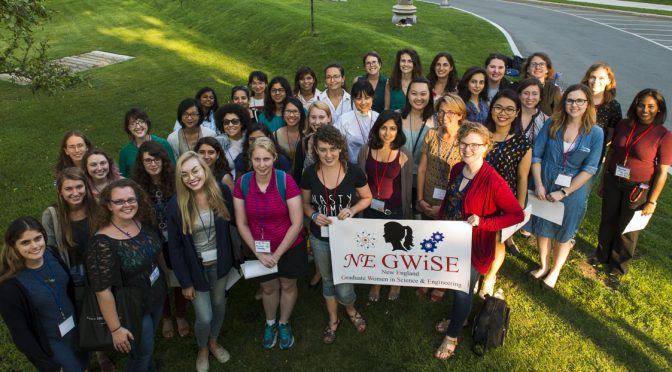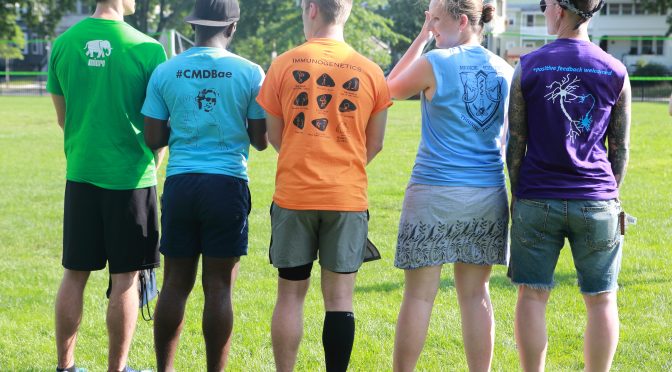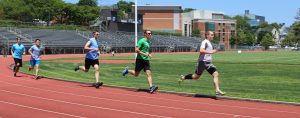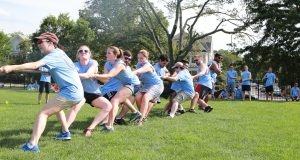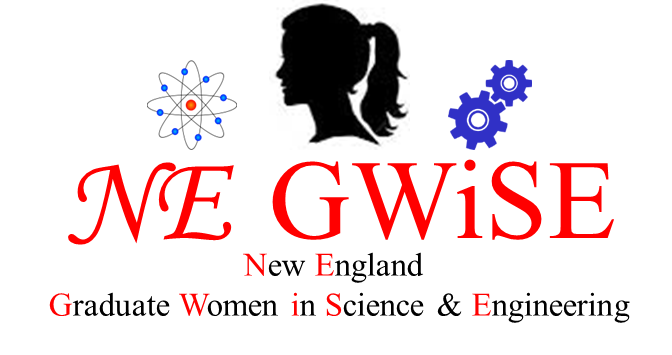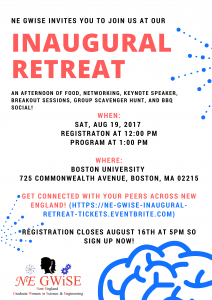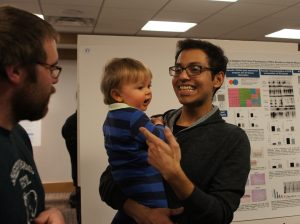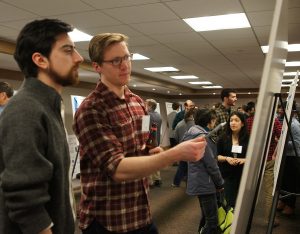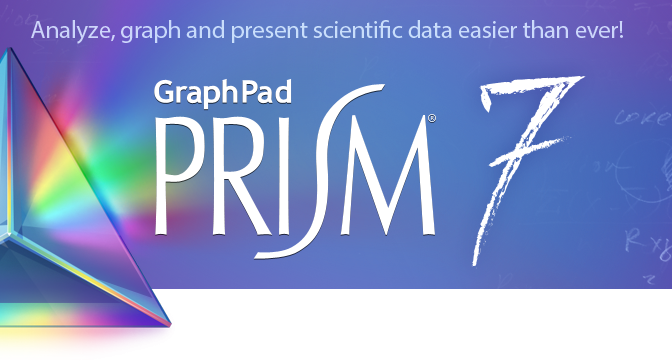This past June, around seventy-five graduate students and faculty members joined Dean Dan Jay and Associate Dean Dan Volchok in the DeBlois Auditorium to reflect on the previous year’s progress and endeavors at the Sacker School. Various community leaders briefly presented on topics that reflect the Deans’ new mission of training to career excellence followed by open discussion between all attendees. Following the larger meeting, attendees continued to engage in these topics in smaller groups over lunch to continue pushing these goals forward in the coming year.
Jay opened the meeting by reviewing the results of career development “trial balloons” that the new administration worked towards last year. He celebrated the high interest and positive reactions from trainees for the new short courses, including Introduction to Drug Development (50 attendees), Navigating the Corporate Environment (22 attendees), and the R Programming Workshop (34 attendees). Building on this positive momentum, additional short courses will be offered in the coming year. A ‘science storytelling’ workshop and an entrepreneurship short course have been developed for the fall semester, with a teaching short course planned for the spring. There are also plans to develop the Introduction to Drug Development course into an official Sackler-wide elective for the spring semester. In addition, two career counseling workshops by Sarah Cardozo Duncan will again be offered in the 2018-2019 for students and post-docs who are interested in industry-related careers.
Not all career development endeavours in Sackler last year had such immediate success, however. The initiative to place students who have completed Year 1, Year 2, or their thesis requirements in summer industry internships encountered several difficulties, including reluctance from potential partner companies. That reluctance mainly stemmed from aversion to such a short internship time period (3 months), as several companies in conversation with Sackler administration requested at least a 6-month full-time commitment from students. Meeting attendees generally agreed that this length of time would be difficult for both PIs and students to commit to without serious disruption to research progress. However, there was at least one successful internship negotiation and placement, suggesting that the program may still be developed but not in as broad a manner as originally intended. A case-by-case determination was concluded to be the best approach moving forward, with the requirement for extensive conversations and mutual agreement between student, PI, and hosting company on timeline and degree of commitment being emphasized.
In reiterating his desire to see Sackler become a leader in career training for biomedical graduate students, Jay described his aspiration to develop a tuition-bearing, two-year master’s program in Biomedical Leadership. Matriculating students would have the opportunity to train for various career tracks related to biomedical research, and their curriculum would include current and future career development short courses or electives offered within Sackler. During the group-wide discussion session, the possibility of offering a 4+1-style master’s program in collaboration with the undergraduate branch of Tufts University was put forward and positively received.
Another main topic of the community meeting was the state of graduate research training at Sackler. Opening discussions involved debating the merits of switching from the current program-specific curriculum design to a single core curriculum that all first-year graduate trainees–regardless of program–would take. Across programs, students generally were opposed to a core curriculum in regards to scientific content, emphasizing that most seek a graduate education specifically to specialize in a particular area. They did support the suggestion that any core courses in scientific content should be ‘nanocourses’, instead of full required or elective courses. In contrast, developing a skills-focused core curriculum that included classes such as research methods, quantitative biology & bioinformatics, and statistics seemed to have wide support from both students and faculty. In addition to curriculum content, the possibility of expanding the MERGE (Medically-Oriented Research in Graduate Education) beyond the Immunology and Molecular Microbiology programs was discussed. The MERGE program trains participants in clinical aspects of their research area during the summer prior to their first graduate year at Sackler. During this time, they are also paired with a clinical mentor who provides them direct contact with patients and clinicians and serves as a thesis committee member during their research training. Given the proximity of Tufts Medical Center, it was advocated for the Sackler School to take advantage of the opportunity to give more PhD students training in regards to the clinical impact of their research. Genetics and Neuroscience were considered as programs which MERGE could expand to, but no specific plans for that expansion were discussed.
Strengthening the Sackler community was also a significant theme of the meeting. During a discussion about building diversity and inclusion at Sackler, students expressed the need for more structured support from the school. They expressed that while student-led initiatives such as SPINES (Students Promoting Inclusive Excellence at Sackler) provide excellent resources and opportunities for underrepresented minority (URM) students, the responsibility of delivering such support should not fall so heavily on the trainees themselves. Through this discussion, it was emphasized that bringing more URM junior faculty–from Tufts or other institutions–to speak at graduate seminars could help build networks for students to rely on. In addition, hosting a greater number of Sackler-wide events during the year, especially during recruitment, could foster a greater sense of community and provide more school-directed opportunities for URM individuals to connect across programs. Another discussion about community building focused on developing stronger alumni networks. The career development short courses were one way in which the Dean’s Office started on this initiative already. Various alumni contributed their expertise and their time to the courses’ development and operation, which was key to their success; this arrangement also provided a structured environment in which students could take the opportunity to develop professional connections with alumni in their career areas of interest. Given the positive outcomes from this year using this approach, there are plans to build on this foundation for similar endeavours in the future. Dean Jay also discussed his efforts over the last year in reaching out to Sackler alumni for fundraising, which he had done in collaboration with Roxanne Beal from the School of Medicine’s Office of Advancement and Alumni Relations. To broaden this effort, faculty were encouraged to reach out to their former trainees, and the group supported the idea of current students reaching out to alumni for an annual fund.
Overall, the morning and lunchtime discussions provided great insight into the past year’s success as well as highlighted what aspects of graduate training at Sackler still need to be strengthened, and the dialogue between students, faculty, and staff generated actionable items for the administration to take on in the coming academic year.

